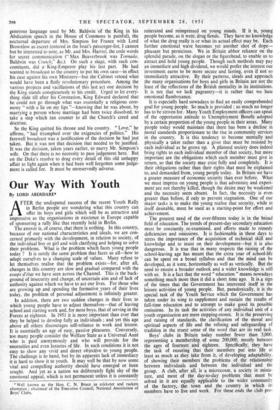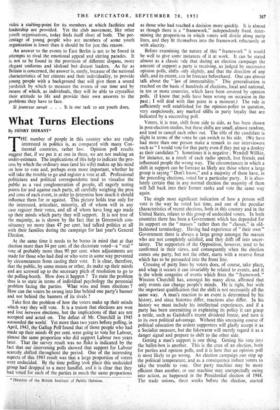Our Way With Youth
By LORD ABERDARE*
FTER the undisputed success of the recent Youth Rally in Berlin people are wondering what this country can offer its boys and girls Which will be as attractive and impressive as the organisations in existence in Europe capable of sponsoring a rally like that recently held in Berlin. The answer is, of course, that there is nothing. In this country, because of our national characteristics and ideals, we are con- cerned primarily with the development, in relation to society, of the individual boy or girl and with clarifying and helping to solve their problems. What is the problem which faces young people today ? It is surely the same problem that faces us all—how to adapt ourselves to a changing scale of values. Many refuse to let themselves realise that the problem exists—for, after, all, changes in this country are slow and gradual compared with the coups d'etat we have seen across the Channel. This is the back- ground of insecurity and change, of uncertain aim and of lack of authority against which we have to act our lives. For those who are growing up and spending the formative years of their lives today, the problem of personal adjustment is infinitely greater.
In addition, there are two sudden changes in their lives to which young people have to adjust themselves—that of leaving school and starting work and, for most boys, that of serving in the Forces at eighteen. In 1951 it is more important than ever that they be helped to develop fully, as individuals ; and yet this age above all others discourages self-reliance in work and leisure. It is essentially an age of easy, passive pleasures. Conversely, too many people consider the Welfare State as a Universal Aunt who is paid anonymously and who will provide for the necessities and even luxuries of life. In such conditions it is not easy to show any vivid and direct objective to young people. The challenge is to hand, but by its apparent lack of immediacy it is hard to show it to youth. It may well be that by now some vital and compelling authority should have emerged or been sought. And yet as a nation we deliberately fight shy of the emotional appeal, which is not permanent unless it is constantly
* Well known as the Hon. C. N. Bruce as cricketer and rackets champion ; chairmad of the Executive Council, National Association of Boys' Clubs.
reiterated and reimpressed on young minds. If it is, young people become, as it were, drug fiends. They have no knowledge of what the drug really is or what its actual effect may be. Each further emotional wave becomes yet another shot of dope— pleasant btjt pernicious. We in Britain abhor reliance on the splendid parade, on the slogan or the figurehead, to enable us to attract and hold young people. Though such methods may pay an immediate and high dividend, we would prefer the interest our investment earns to be more secure and lasting, even if not so immediately attractive. By their patterns, ideals and approach the many organisations for boys and girls in- Britain are not the least of the reflections of the British mentality in its institutions. It is not that we lack pageantry—it is rather that we hate emotional flamboyance.
It is especially hard nowadays to find an easily comprehended goal for young people. So much is provided ; so much no longer has to be striven for.- Many Youth Employment officers can speak of the opportunist attitude to Unemployment Benefit adopted by a certain proportion of the young people in their areas. Many people today would maintain that there has been a decline in moral standards proportionate to the rise in community services in the country. It is this tendency to become mentally -and physically a taker rather than a giver that must be resisted by each individual as he grows up. A planned society (does indeed bring rights to each individual member of that society, but more important are the obligations which each member must give in return, so that the society may exist fully and completely. It is their obligations rather than their rights that must be explained to, and demanded from, young people today. In Britain we have a greater measure of economic security than ever before. What we must impress on young people is that adventure and experi- ment' are not thereby killed, though the desire may be weakened and the necessity seem absent. In fact, the necessity is even greater than before, if only to preVent stagnation. One of our major tasks is to make the young realise that security, while in itself desirable, must be used as a starting-point for effort and achievement.
The greatest need of the over-fifteens today is in the broad field of education. The trends of present-day secondary education must be constantly, re-examined, and efforts made to remedy deficiencies and omissions. It is fashionable in these days to ' stress the importance of the acquisition of technical skill and knowledge and to insist on their development—but it is also dangerous. It is true that in many respects the raising of the school-leaving age has meant that the extra year of school-life \ can be spent • on a broad syllabus and that the mind can be developed, as it were, horizontally as well as vertically. But the need to ensure a broader outlook and a wider knowledge is still with us. It is a fact that the word " education " means nowadays something much more than it did a short time ago. It is a Sign of the times that the Government has interested itself in the leisure activities of young people- But, paradoxically, it is the special task of the Youth Service which the Government has taken under its wing to supplement and sustain the results of full-time education and to attempt to make good its possible omissions. In its task the activities of any individual unit of a youth organisation are mere stepping-stones. It is the preserving and raising of standards, the clarification of the moral and spiritual aspects of life and the refining and safeguarding of tradition in the truest sense of the word that are its real task.
Boys' clubs in Britain today number fewer than 3,000, representing a membership, of some 200,000, mostly between the ages of fourteen and eighteen. Specifically, they have the task of ensuring that their members put into life at least as much as They take from it, of developing adaptability, of showing their members the problems of the relationship between individuals and between the individual and the group. A club, after all, is a microcosm, a society in minia- ture, and most of the day-to-day problems that must be solved in it are equally applicable to the wider community of the factory. the town and the country in which its members have to live and work. For these ends the club pro- vides a stalling-point for its members at which facilities and leadership are provided. Yet the club movement, like other youth organisations, today finds itself short of both. The per- centage of young people who are members of some youth organisation is lower than it should be for just this reason.
An answer-to the events in East Berlin is not to be found in attempts to rival the emotional appeal and stirring parades. It is not to be found in the provision of different slogans, more elegant uniforms and idolised but • distant leaders. As far as Britain is concerned, the answer is, surely, because of the national characteristics of her citizens and their individuality, to provide young people with a background that will give them a sound yardstick by which to measure the events of our time and by means of which, as individuals, they will be able to crystallise their attitude to life and provide their own answers to the problems they have to face.
Si jeunesse savait . . It is our task to see youth does.



































 Previous page
Previous page